Five Computer Science Professors and their Students Receive Best Paper Award at International Conferences in Fall 2017
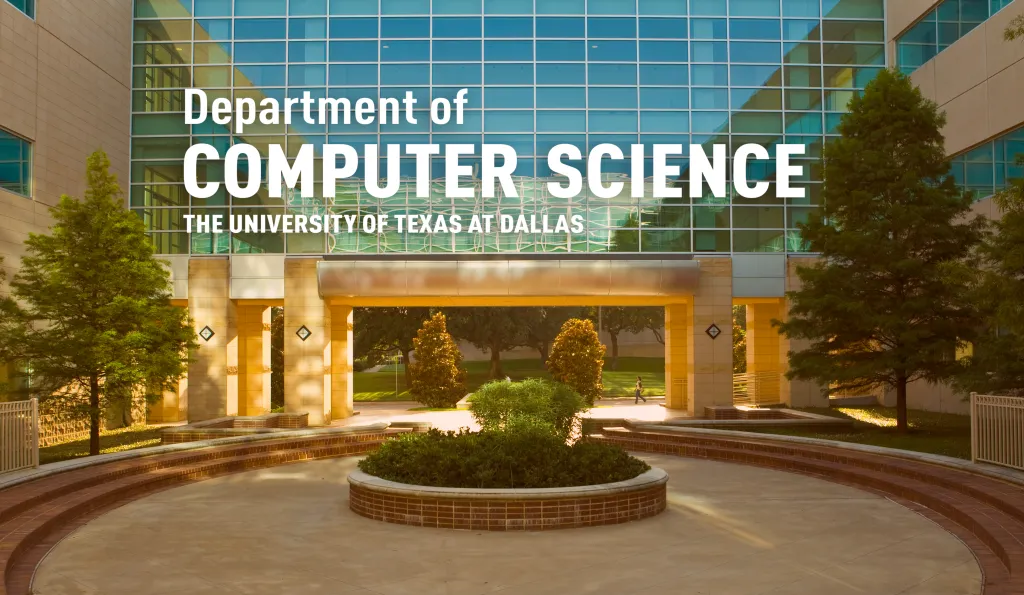
UT Dallas Computer Science faculty members are world-renowned for their research and scholarship. The CS Department ranks within top 50 on csrankings.org (2008-2018 period). Fifteen of its faculty members hold the prestigious NSF CAREER Awards, and three of them have been recognized as Air Force Young Investigators. UT Dallas CS Faculty members have received numerous best paper awards, including most influential paper awards. During the Fall 2017 semester alone, five CS faculty members and their students received best paper awards at five different conferences. Drs. Jorge Cobb, Sanda Harabagiu, Cong Liu, Andi Marcus, B. Prabhakaran and their respective students’ research was recognized by prestigious conferences that include the IEEE Conference on Network Functions Virtualization and Software Defined Networks (NFV-SDN), American Medical Informatics Association (AMIA) Annual Symposium, IEEE Real-Time Systems Symposium (RTSS), IEEE International Conference on Software Maintenance and Evolution (ICSME), and the ACM Multimedia Conference (ACM-MM).
Dr. Jorge Cobb, a UT Dallas CS Professor, and his PhD student, Krishna Kadiyala, recently were awarded ‘Best Paper’ at the 2017 IEEE Conference on Network Function Virtualization and Software Defined Networks (NFV-SDN) for their paper titled, “Inter-AS Traffic Engineering with SDN.” In this paper, Dr. Cobb and Ms. Kadiyala looked at the problem of choosing an optimal set of egress routers to route inter-domain transit traffic in a hybrid SDN network such that the maximum link utilization of the egress links is minimized. In their research, they formulate the optimization problem, show that it is related to the makespan scheduling problem of unrelated parallel machines, and propose heuristics to solve it. Dr. Cobb and his student performed simulations to evaluate their heuristics on a real ISP topology and show that even with a small number of SDN nodes in the network, the maximum link utilization on the egress links can be lower than that of traditional HPR. You can read more about this paper by clicking here. The 2017 IEEE NFV-SDN conference focused on first operational results related to virtualized networks functions (VNFs) as well as describing new applications of VNFs which smarten networks and their usage. To learn more about Network Functions Virtualizations (NFV) and Software Defined Networks, click here.
Dr. Sanda Harabagiu, a UT Dallas CS professor and Research Initiation Chair in the Erik Jonsson School of Engineering and Computer Science, and Travis Goodwin, a computer science PhD student at UT Dallas, were recently received the Homer R. Warner Award at the 2017 American Medical Informatics Association’s (AMIA) Annual Symposium. The award recognizes a symposium paper that best describes approaches to improving computerized information acquisition, knowledge data acquisition and management, and experimental results documenting the value of these approaches.
Goodwin also was the lead author of “Inferring Clinical Correlations from EEG Reports with Deep Neural Learning,” which was presented at the 2017 American Medical Informatics Association’s (AMIA) Annual Symposium. The paper presents a novel method for automatically extracting and analyzing the clinical correlations between findings documented in a neurological report and the overall clinical picture of the patient, which helps to mitigate misdiagnoses and improve patient care. The research was funded by a grant from the National Institutes of Health through its Big Data to Knowledge program. This is the second consecutive year that Goodwin received a prestigious award at a conference. In 2016, the paper “Medical Question Answering for Clinical Decision Support,” co-authored with Dr. Harabagiu, received the Best Student Paper Award from the ACM International Conference on Information and Knowledge Management (CIKM). “Travis is an exceptionally creative student who shows incredible promise. I think he will be an excellent academic because of his creativity, his hard work and his effectiveness in being able to see what other people have not yet seen,” Harabagiu said.
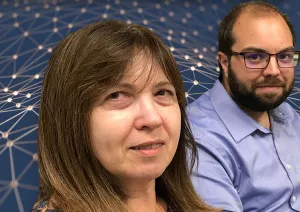
Dr. Cong Liu, Computer Science professor and expert in the field of Real-Time Systems, and his PhD Student, Zheng Dong were recently awarded ‘Most Outstanding Paper’ at the 2017 IEEE Real-Time Systems Symposium (RTSS) for their research paper titled, “Analysis Techniques for Supporting Hard Real-Time Sporadic Gang Task Systems.” IEEE Real-Time Systems Symposium (RTSS) is the premier conference in the area of real-time systems, presenting innovations in the field with respect to theory and practice. Each year RTSS accepts between 20 to 30 papers, with an acceptance ratio around 20%. Dr. Liu and Zheng Dong had three papers accepted in the 2016 IEEE Real-Time Systems Symposium (RTSS). (Click here to read more about this story)
We spoke to Dr. Liu about his award-winning paper. “Data-driven embedded systems are here. The ability to create algorithms that process massive amounts of real-time sensor-captured data is enabling designers in many industries to develop intelligent embedded systems that automate actions and decisions. This emerging data-intensive embedded computing paradigm brings a new set of data-induced challenges on guaranteeing timing predictability — enabling timing constraints to be analytically validated at design time. Timing predictability is one of the most important tenets in the certification required for many safety-critical embedded systems.” Dr. Liu continued by saying, “An example is the autonomous driving system, whose functional correctness hinges crucially upon temporal correctness, as the control operations depend on the real-time processing of environmental data and computational tasks. Unfortunately, data-induced execution parallelism, as a common characteristic seen in many data-intensive workloads, cause hard challenges on guaranteeing timing predictability. This paper presented the first timing analysis framework that is able to analyze and support workloads implemented under general parallel programming disciplines in a multicore system with guaranteed timing predictability.”
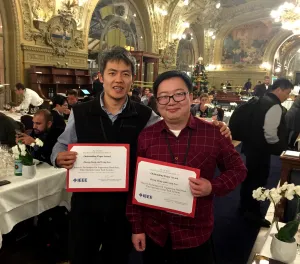
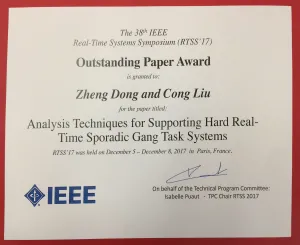
Dr. Liu, an expert in real-time systems, recently received an NSF CAREER Award for his research. He also teaches courses in that area. These courses mainly address the fundamental concepts in real-time scheduling theory and real-time operating systems. System-oriented course projects are required to help students gain experience in building and improving real-time operating systems.
Dr. B. Prabhakaran, a UT Dallas CS Professor and expert in multimedia systems, and his PhD student’s, Yuan Tian and Suraj Raghuraman, recently received the ‘Best Student Paper Award’ at the 25th ACM Multimedia Conference 2017 (ACM-MM) for their paper titled, “H-TIME: Haptic-enabled Tele-Immersive Musculoskeletal Examination.” In their paper, a Haptic-enabled Tele-Immersive Musculoskeletal Examination (H-TIME) system is introduced, that allows doctors to physically examine musculoskeletal conditions of the patients remotely, by looking at the 3D reconstructed model of the patient in the virtual world, and physically feeling the patient’s range of mobility using a haptic device. The proposed bidirectional haptic rendering in H-TIME can allow the doctor to evaluate a patient who suffers from problems in their upper extremities, such as the shoulder, elbow, wrist, etc., and evaluate them remotely. Real world user studies between the doctors and the patients were performed, highlighting the potential of the proposed system. The study indicated a high degree of correlation between the in-person and H-TIME evaluations of the patient. Both the doctors and patients involved in the study felt that the system had the potential to someday replace in-person consultations. The paper was co-written by Drs. Thiru Annaswamy, Aleksander Borresenr, both from UT South Western Medical Center, and Dr. Klara Nahrstedt from the University of Illinois at Urbana-Champaign.
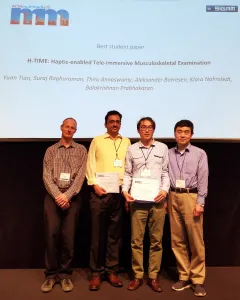
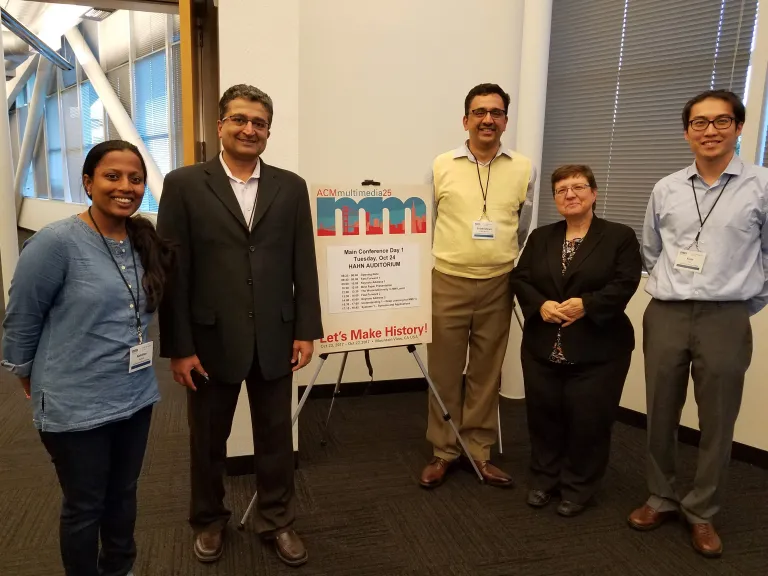
Last summer, Dr. Prabhakaran was one of eight researchers chosen by the NSF to go to Capitol Hill to present his research with advanced 3D modeling, virtual and mixed reality and networking technologies. Dr. Prabhakaran and his team have developed remote physical therapy options, allowing veterans to receive necessary care even when a doctor can’t be on site. If you would like to read more about this news, click here.
Dr. Andrian Marcus, together with his doctoral students, Oscar Chaparro, and Juan Manuel Florez, received the IEEE TCSE Distinguished Paper Award at the 33rd IEEE International Conference on Software Maintenance and Evolution (ICSME 2017) held in Shanghai, China. The award was given for the first time at an IEEE sponsored conference and was voted by a special award committee.
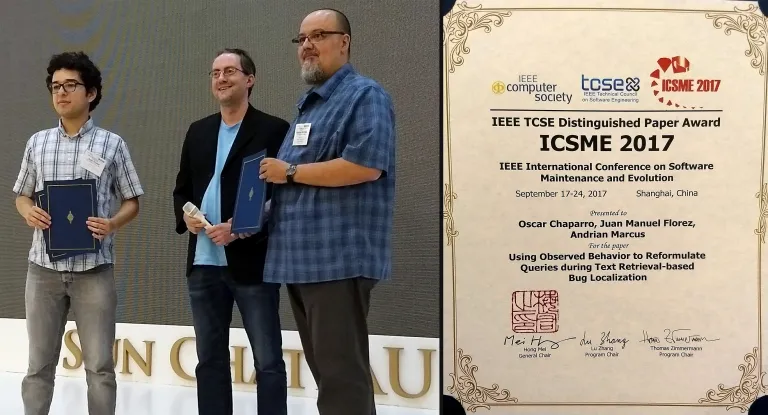
The paper is entitled “Using Observed Behavior to Reformulate Queries during Text Retrieval-based Bug Localization,” presents results from the dissertation research of Oscar Chaparro, who is the lead author of the paper. The work improves state of the art in automated bug localization in source code by using text retrieval approaches. The approach presented in the paper proposes a query reformulation strategy that developers can use to improve the retrieval performance. The strategy is based on using structural elements of the bug descriptions, specifically the description of the observed behavior of the buggy system.
ABOUT THE UT DALLAS COMPUTER SCIENCE DEPARTMENT
The UT Dallas Computer Science program is one of the largest Computer Science departments in the United States with over 2,400 bachelors-degree students, more than 1,000 master’s students, 150 Ph.D. students, 53 tenure-track faculty members and 38 full-time senior lecturers, as of Fall 2017. With The University of Texas at Dallas’ unique history of starting as a graduate institution first, the CS Department is built on a legacy of valuing innovative research and providing advanced training for software engineers and computer scientists.




